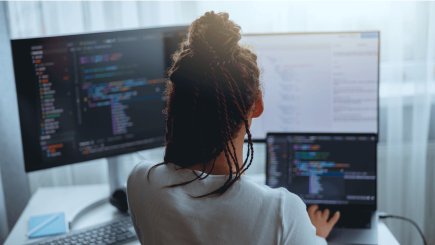
Learn data encoding with online courses and programs
Data encoding is how we communicate information digitally and it’s essential to sharing and storing information on computers. Learn data encoding with online courses from edX.

What is data encoding?
Language is the primary vehicle through which humans encode information. To communicate a message to a friend, you choose words to convey your meaning; your friend then decodes those words to discover your meaning.
These are the same mechanics behind encoding and decoding in computer systems. For computers to relay our language-based information to other computers, they must first encode that information by assembling a sequence of characters (letters, numbers, punctuation, and specific symbols) into a binary-based, data-encoding scheme computers can process — like American Standard Code for Information Interchange (ASCII) or Unicode.1
Unlike encryption, a form of data encoding used to secure confidential data, everyday data encoding involves changing data into a new format that ensures its effective transmission, integrity, and usability.2 Errors in data encoding can lead to corrupted or lost files that cannot be decoded, resulting in a communication breakdown between computer or network systems. Such errors can be highly problematic in today’s world of constant digital communication, where encoding is as common and necessary as human speech.
Browse online Data Encoding Certificates
Find new interests and advance your career opportunities
Stand out in your field
Use the knowledge and skills you have gained to drive impact at work and grow your career.
Learn at your own pace
On your computer, tablet or phone, online courses make learning flexible to fit your busy life.
Earn a valuable credential
Showcase your key skills and valuable knowledge.
Certificates
Related Topics
Data encoding course curriculum
Some of the components in a data encoding course curriculum can include understanding the nature of computers and code, operating systems, and computational thinking. It’s important to have a solid understanding of computer science basics before pursuing more advanced data science or programming courses.
Data encoding techniques are taught in conjunction with a variety of programming languages, such as C, JavaScript, PHP, and Python.3 Examples of the various encoding schemes include:
- ASCII
- EBCDIC
- Unicode
- Hex
Every programming language is based on the core computer science concepts of abstraction, sequencing, control structures, and data structures, and learners can expect to draw on these fundamentals when studying data encoding.4
Once you’ve absorbed the basics of data encoding, you might want to dig deeper into related topics like data science and data analytics, which rely on data encoding knowledge and skills. edX offers a range of online learning opportunities that work for all types of learners, including accelerated boot camps as well as bachelor’s degrees, and master’s degrees.
Explore jobs that use data encoding
Data encoding jobs are important to a world where more communication is happening digitally. This communication relies on hundreds of different programming languages, all of which depend on data encoding to transfer messages or object data across systems and networks.5
Learners with in-depth data encoding knowledge and advanced programming skills can take advantage of this changing landscape. Jobs that rely on data encoding techniques include:6
- Computer and information research scientist
- Computer programmer
- Database architect
- Information security analyst
- Software developer
- Web developer
How to become a data encoder
Just as knowing grammar and syntax rules is key to any career that involves written communication, data encoding skills can be important for learners who want to pursue a career in computer science, data science, or a related field. Encoding and decoding are essential building blocks of programming and data science, and learners with a firm grasp of how to encode data will be able to tackle more complex challenges like analyzing data sets, writing code, and building software programs.7
For those hoping to quickly sharpen their coding and computer science skills, edX offers accessible and fast-paced boot camps or full bachelor’s in data science degree programs to help diverse learners advance their careers. Find the right fit that aligns with your personal and professional goals.
More opportunities for you to learn
We've added 500+ learning opportunities to create one of the world's most comprehensive free-to-degree online learning platforms.
Frequently Asked Questions
Definition: Encoding and Decoding. (2023). TechTarget. Retrieved January 31, 2023.
Encryption, Encoding, and Hashing: Explained. (2022). Packetlabs. Retrieved January 31, 2023.
Most Popular Technologies: Programming, Scripting, and Markup Languages. (2020). StackOverflow. Retrieved February 1, 2023.
These 4 Concepts Are in Every Coding Language. (2021). Codelicious. Retrieved February 1, 2023.
Definition: Encoding and Decoding. (2023). TechTarget. Retrieved January 31, 2023.
Computer and Information Technology Occupations. (2022). U.S. Bureau of Labor Statistics. Retrieved January 31, 2023.
Definition: Encoding and Decoding. (2023). TechTarget. Retrieved January 31, 2023.